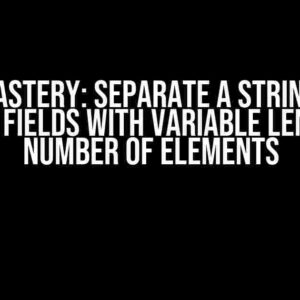Kotlin and Rust are two popular programming languages that have gained significant attention in recent years. While Kotlin is primarily used for Android app development, Rust is gaining popularity for systems programming. One of the fascinating features of Kotlin is its scope functions, which provide a concise way to perform operations on objects. But, have you ever wondered if we can use Kotlin scope functions in Rust? In this article, we’ll explore the possibilities and provide a comprehensive guide on how to achieve similar functionality in Rust.
What are Kotlin Scope Functions?
Kotlin scope functions, also known as functional literals, are a set of functions that provide a concise way to perform operations on objects. These functions are part of the Kotlin standard library and are used extensively in Android app development. The most commonly used scope functions in Kotlin are:
let: executes a block of code and returns the resultrun: executes a block of code and returns the result, similar tolet, but with a more idiomatic syntaxapply: executes a block of code and returns the object itselfalso: executes a block of code and returns the object itself, similar toapply, but with a more idiomatic syntaxtakeIfandtakeUnless: execute a block of code and return the object if the predicate is true or false, respectively
Why Can’t We Use Kotlin Scope Functions in Rust?
Rust and Kotlin are two distinct programming languages with different syntax, semantics, and philosophies. While Kotlin is an object-oriented language, Rust is a systems programming language with a focus on memory safety and performance. The syntax and standard libraries of these languages are incompatible, making it impossible to use Kotlin scope functions directly in Rust.
However, that doesn’t mean we can’t achieve similar functionality in Rust. Rust has its own set of language features and libraries that can help us implement similar functionality to Kotlin scope functions.
Implementing Scope Functions in Rust
Let’s explore how we can implement similar functionality to Kotlin scope functions in Rust. We’ll focus on the let, run, apply, and also functions, as they are the most commonly used scope functions in Kotlin.
Implementing let in Rust
In Rust, we can use the let keyword to declare a new variable and assign it a value. However, we can also use the let keyword to implement a similar functionality to the Kotlin let function.
fn main() {
let x = 5;
let y = {
let z = x * 2;
z + 1
};
println!("y: {}", y); // prints y: 11
}In this example, we use the let keyword to declare a new variable y and assign it the result of an expression. This is similar to the Kotlin let function, which executes a block of code and returns the result.
Implementing run in Rust
In Rust, we can use a closure to implement a similar functionality to the Kotlin run function. A closure is an anonymous function that captures its environment and can be used as a value.
fn main() {
let x = 5;
let y = (|| {
let z = x * 2;
z + 1
})();
println!("y: {}", y); // prints y: 11
}In this example, we use a closure to implement a similar functionality to the Kotlin run function. The closure captures the x variable and returns the result of an expression.
Implementing apply in Rust
In Rust, we can use the Self keyword to implement a similar functionality to the Kotlin apply function. The Self keyword returns the object itself, allowing us to chain method calls.
struct Person {
name: String,
age: i32,
}
impl Person {
fn new(name: String, age: i32) -> Self {
Person { name, age }
}
fn set_name(&mut self, name: String) -> Self {
self.name = name;
self
}
fn set_age(&mut self, age: i32) -> Self {
self.age = age;
self
}
}
fn main() {
let person = Person::new("John".to_string(), 30)
.set_name("Jane".to_string())
.set_age(25);
println!("Person: {} {}", person.name, person.age); // prints Person: Jane 25
}In this example, we use the Self keyword to implement a similar functionality to the Kotlin apply function. The set_name and set_age methods return the object itself, allowing us to chain method calls.
Implementing also in Rust
In Rust, we can use a closure to implement a similar functionality to the Kotlin also function. A closure can capture the object itself and return it after executing a block of code.
fn main() {
let mut person = Person::new("John".to_string(), 30);
let person = {
person.set_name("Jane".to_string());
person.set_age(25);
person
};
println!("Person: {} {}", person.name, person.age); // prints Person: Jane 25
}In this example, we use a closure to implement a similar functionality to the Kotlin also function. The closure captures the person object, executes a block of code, and returns the object itself.
Conclusion
In this article, we explored the possibilities of using Kotlin scope functions in Rust. While we can’t use Kotlin scope functions directly in Rust, we can implement similar functionality using Rust’s language features and libraries. By using closures, the let keyword, and the Self keyword, we can achieve similar functionality to Kotlin scope functions in Rust.
Rust and Kotlin are two distinct programming languages with different syntax, semantics, and philosophies. However, by understanding the core concepts and language features of each language, we can bridge the gap and implement similar functionality across languages.
| Kotlin Scope Function | Rust Equivalent |
|---|---|
let |
let keyword or closures |
run |
Closures |
apply |
Self keyword |
also |
Closures |
By understanding the similarities and differences between Kotlin and Rust, we can develop a deeper appreciation for the strengths and weaknesses of each language. Whether you’re a Kotlin developer looking to explore Rust or a Rust developer looking to explore Kotlin, this article should provide a comprehensive guide to implementing Kotlin scope functions in Rust.
Final Thoughts
In conclusion, Kotlin scope functions in Rust? – While we can’t use Kotlin scope functions directly in Rust, we can implement similar functionality using Rust’s language features and libraries. By understanding the core concepts and language features of each language, we can bridge the gap and implement similar functionality across languages.
Whether you’re a seasoned developer or just starting out, I hope this article has provided a comprehensive guide to implementing Kotlin scope functions in Rust. Remember, the key to mastering a programming language is to understand its syntax, semantics, and philosophies. By doing so, you can unlock the full potential of each language and develop a deeper appreciation for the world of programming.
Frequently Asked Question
Rust, the systems programming language, has gained popularity for its memory safety features and performance. But have you ever wondered about the scope functions in Rust, especially when coming from a Kotlin background? Let’s dive into the world of scope functions in Rust!
What is the equivalent of Kotlin’s `let` function in Rust?
Rust has no direct equivalent to Kotlin’s `let` function. However, you can use pattern matching with the `if let` or `match` expressions to achieve similar functionality. For instance, `if let Some(value) = optional_value { … }` is similar to Kotlin’s `val value = optionalValue?.let { … }`.
How do I implement Kotlin’s `run` function in Rust?
Rust has no built-in equivalent to Kotlin’s `run` function, but you can use closures to achieve similar functionality. For example, `let result = || { … }();` is similar to Kotlin’s `val result = run { … }`.
Is there an equivalent to Kotlin’s `apply` function in Rust?
Rust has no direct equivalent to Kotlin’s `apply` function. However, you can use the `map` method on a `Result` or `Option` to achieve similar functionality. For example, `optional_value.map(|value| { … })` is similar to Kotlin’s `optionalValue?.apply { … }`.
Can I use Kotlin’s `also` function in Rust?
Rust has no direct equivalent to Kotlin’s `also` function. However, you can use the `and_then` method on a `Result` or `Option` to achieve similar functionality. For example, `optional_value.and_then(|value| { … })` is similar to Kotlin’s `optionalValue?.also { … }`.
How do I implement Kotlin’s `with` function in Rust?
Rust has no built-in equivalent to Kotlin’s `with` function. However, you can use closures to achieve similar functionality. For example, `let result = { let value = …; … }();` is similar to Kotlin’s `val result = with(value) { … }`.






